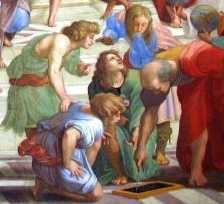But in the interest of finishing the Morning Hymns for Ordinary Time so I can start on the Vespers hymns, here is Aeterna rerum conditor (to be followed tomorrow by Splendor paternae gloriae).
Ætérne rerum cónditor,
Eternal maker of the world,
noctem diémque qui regis,
who rules both the night and day,
et témporum das témpora,
and gives a variety of seasons
ut álleves fastídium;
to relieve monotony!
Maker of all, eternal King,
who day and night about dost bring:
who weary mortals to relieve,
dost in their times the seasons give:
2. Præco diéi iam sonat,
The herald of the day (the rooster)sends forth his cry

noctis profúndæ pérvigil,
always watchful through the depths of night
noctúrna lux viántibus
a nocturnal light to wayfarers,
a nocte noctem ségregans.
separating watch from watch
2. Now the shrill cock proclaims the day,
and calls the sun's awakening ray,
the wandering pilgrim' guiding light,
that marks the watches night by night.
3. Hoc excitátus lúcifer
While he sings, the awakened morning star
solvit polum calígine,
scatters the darkness of the heavens
hoc omnis errónum chorus
all the multitude of vagabonds
vias nocéndi déserit.
abandon their deeds of violence.
3. Roused at the note, the morning star
heav'n's dusky veil uplifts afar:
night's vagrant bands no longer roam,
but from their dark ways hie them home.
4. Hoc nauta vires cólligit
While he sings, the sailor gathers new strength,
pontíque mitéscunt freta,
the raging of the sea subsides:
hoc ipse Petra Ecclésiæ
while he sings, the very Rock of the Church
canénte culpam díluit.
washes away his sin.
4. The encouraged sailor's fears are óer,
the foaming billows rage no more:
Lo! éen the very Church's Rock
melts at the crowing of the cock.
7. Iesu, labántes réspice,
O Jesus, look with compassion upon the wavering
et nos vidéndo córrige,
and correct us with Thy look (as Thou didst correct Peter)
si réspicis, lapsus cadunt
if Thou dost but look, our sins vanish,
fletúque culpa sólvitur.
and our guilt is washed away by our tears.
7. Look in us, Jesu, when we fall,
and with Thy look our souls recall:
if Thou but look, our sins are gone,
and with due tears our pardon won.
8. Tu lux refúlge sénsibus,
O Light, shine Thou into our hearts,
mentísque somnum díscute,
dispel the lethargy of the soul;
te nostra vox primum sonet
may our voice first praise Thee,
et vota solvámus tibi.
and to Thee may we pay our vows.
8. Shed through our hearts Thy piercing ray,
our soul's dull slumber drive away:
Thy Name be first on every tongue,
to Thee our earliest praises sung.
9. Sit, Christe, Rex piíssime,
tibi Patríque gloria
cum Spíritu Paráclito,
in sempitérna saécula. Amen.
9. All laud to God the Father be;
all praise, Eternal Son, to Thee;
all glory, as is ever meet,
to God the Holy Paraclete. Amen.
You may notice that the numbering of the verses above skips from 4 to 7. This is due to the two other verses, which the Liber Hymnarius leaves out, but which were included in Britt:
[5. Surgamus ergo strenue!
Let us therefore arise with alacrity;
Gallus iacentes excitat,
the cock awakens the sleepers,
et somnolentos increpat,
chides the drowsy
Gallus negantes arguit.
and rebukes the unwilling.
5. O let us then like men arise;
the cock rebukes our slumbering eyes,
bestirs who still in sleep would lie,
and shames who would their Lord deny.
6. Gallo canente spes redit,
At the crowing of the cock, hope returns;
aegris salus refunditur,
health is restored to the sick;
mucro latronis conditur,
the sword of the robber is sheathed;
lapsis fides revertitur.
confidence returns to the fallen.
6. New hope his clarion note awakes,
sickness the feeble frame forsakes,
the robber sheathes his lawless sword,
faith to fallen is restored. ]
When I have time, I like to sing all nine verses. As Britt says: "The Aeterne reum Conditor, though written on so simple a subject as cock-crowing, is on the of the most beautiful hymns in the Breviary." He goes on to point out that the rooster (which I have highlighted in red everytime he is mentioned in the hymn) is a symbol of the preacher who proclaims the gospel.

1 comment:
I believe your title should be "Sunday Lauds Odd Week". You do have "odd week" as a label, though.
Thanks for your efforts with this. I've been looking for translations of these hymns for quite awhile.
If you speak French, you may be interested in this site, which has (almost) the whole Office translated into French: http://www.scholasaintmaur.net/index.php
It omits the Office of Readings, repeats Lauds with the Invitatory, and frequently uses alternate intercessions (Latin preces, French litanies). I suspect that the intercessions come from Solesmes' "Prières litaniques de l'Office", but I haven't bothered verifying this, despite owning a copy.
Thanks again and bless you for all your good work! :)
Post a Comment